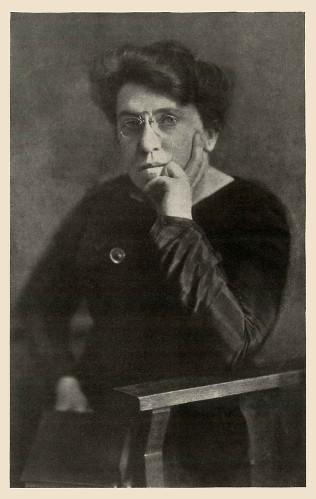THE
SOCIAL SIGNIFICANCE
OF THE MODERN
DRAMA
EMMA GOLDMAN
BOSTON: RICHARD G. BADGER
TORONTO: THE COPP CLARK CO., LIMITED
Copyright, 1914, by Richard G. Badger
All Rights Reserved
The Gorham Press, Boston, U. S. A.
FOREWORD
In order to understand the social and dynamicsignificance of modern dramatic art it is necessary,I believe, to ascertain the difference between thefunctions of art for art's sake and art as the mirrorof life.
Art for art's sake presupposes an attitude ofaloofness on the part of the artist toward the complexstruggle of life: he must rise above the ebband tide of life. He is to be merely an artisticconjurer of beautiful forms, a creator of purefancy.
That is not the attitude of modern art, which ispreëminently the reflex, the mirror of life. Theartist being a part of life cannot detach himselffrom the events and occurrences that pass panorama-likebefore his eyes, impressing themselvesupon his emotional and intellectual vision.
The modern artist is, in the words of AugustStrindberg, "a lay preacher popularizing the pressingquestions of his time." Not necessarily becausehis aim is to proselyte, but because he canbest express himself by being true to life.
Millet, Meunier, Turgenev, Dostoyevsky, Emerson,Walt Whitman, Tolstoy, Ibsen, Strindberg,[Pg 14]Hauptmann and a host of others mirror in theirwork as much of the spiritual and social revolt as isexpressed by the most fiery speech of the propagandist.And more important still, they compelfar greater attention. Their creative genius, imbuedwith the spirit of sincerity and truth, strikesroot where the ordinary word often falls on barrensoil.
The reason that many radicals as well as conservativesfail to grasp the powerful message of art isperhaps not far to seek. The average radical isas hidebound by mere terms as the man devoid ofall ideas. "Bloated plutocrats," "economic determinism,""class consciousness," and similar expressionssum up for him the symbols of revolt.But since art speaks a language of its own, a languageembracing the entire gamut of human emotions,it often sounds meaningless to those whosehearing has been dulled by the din of stereotypedphrases.
On the other hand, the conservative sees

